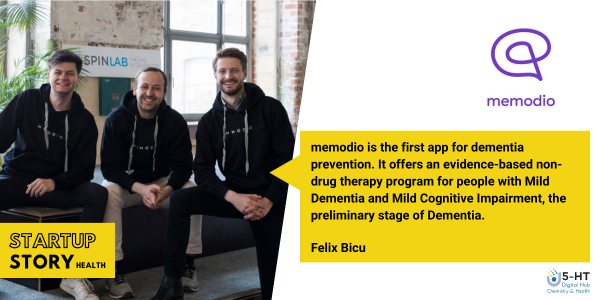Developing an App for Dementia Prevention
Laura Diez
Individuals who are 50 years or older and experience frequent lapses in memory such as forgetting names, dates, or words should be concerned about their health as these memory impairments can indicate the onset of early-stage dementia. In Germany, an estimated 4 to 6 million people are affected by this chronic condition which slowly progresses to severe dementia. Nonetheless, certain lifestyle factors such as nutrition, exercise, social interactions, and cognitive exercises can help delay the progression of this condition. To help prevent forgetfulness, startup company memodio is creating an app specifically designed for those affected.
In this interview, Felix Bicu from the startup memodio talks about the development of their app, which offers a non-drug therapy program for people with mild cognitive impairment and early-stage dementia. Bicu and his colleague, Dr. Doron Stein, saw a huge care gap between the potential of dementia prevention programs and real-life usual care of those affected, which motivated them to create memodio. They discuss their target groups, current and potential customers, and their plans to become the major player for non-drug care delivery in the early stages of cognitive decline. 
How would you explain your solution in three sentences to a professional colleague from the
health sector?
memodio is the first app for dementia prevention. It offers an evidence-based non-drug therapy program for people with Mild Dementia and Mild Cognitive Impairment, the preliminary stage of Dementia. The program includes brain training, sports exercises, a dietary adjustment, optimization of risk factors, strengthening of social participation and other content that facilitates the patients' everyday life. The content is individualised to the functional abilites and the needs of the patient.
What problem motivated you to start the company?
As medical doctors, Felix Bicu and Dr. Doron Stein have seen a number of patients suffer with dementia. Felix himself took care for two Mild Cognitive Impairment cases in his family and experienced the positive effects of a non-drug treatment program with his own eyes. Prior to co-founding memodio, Doron was a consultant for Pharma and Digital Health and led care research projects. He wrote a book on "Care for Early Alzheimer's Disease" published by Springer. Both of us saw the huge care gap between the potential of dementia prevention programs and real-life usual care of those affected. With our application, we want to close this gap and provide an effective treatment for those affected.
How do you convince a pharmaceutical company, a health insurance company or another potential client to set up a pilot project with you?
memodio was developed with patient feedback from MCI and mild dementia patients to better reflect their needs. Special attention was paid to the user interface to be tailored to the target-group and a user retention system was developed to ensure continuous use of the app. Memodio was designed to be as easy to use as possible, so that in product tests memodio was able to show a 13% higher usability score compared to established mental health apps. In the product tests we see the effect: A very high therapy adherence in real live could be shown in real live conditions.
So we know how to build an app that resonates with customers and keeps them engaged. We also know our target groups very well and have shown to meet a need of them. As doctors ourselves we also build quite a large network of doctors and KOL that support us in Germany. The cooperation with health care professional is essential in the access of the German market.
Summarized: We know how to build a great product and know how to bring it to patients. Now we need partners to further shape a better care for people with cognitive decline in Germany.
Who are your current customer (groups) and who do you want your potential customers to be?
Currently, the memodio-app is used by MCI and mild dementia patients from Germany.
Another huge target-group are healthy people that fear dementia due to family experiences or people with subjective cognitive decline. This target group is very engaged in using our app already. We will develop a new and more specific prevention program for these customers, as we see a tremendous need among this group.
Where do you see yourself in 3 years and how can 5-HT support you?
We are aiming to become the major player for non-drug care delivery in the early stages of cognitive decline starting from healthy cognition to manifest dementia. We are happy to be supported by 5-HT in finding partners from clinical medicine, science, insurance and pharma to help us make this vision reality.
5-HT Chemistry & Health Newsletter
Want the latest tech and industry news, events, relevant info from the ecosystem and more?
Subscribe to 5-HT Newsletter now Subscribe to 5-HT Newsletter now
Become part of the 5-HT Chemistry & Health
Exchange ideas with innovative startups and future-oriented companies in our ecosystem. We look forward to meeting you!